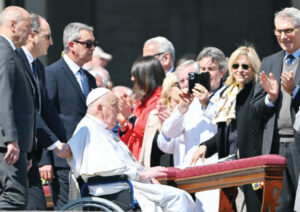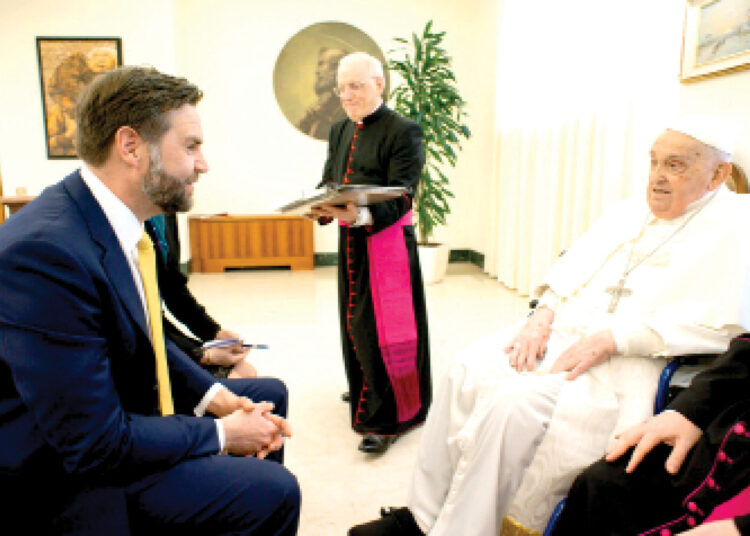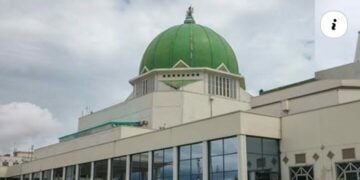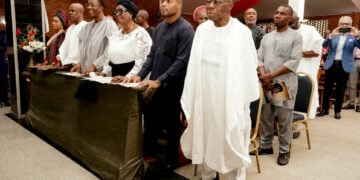Monday, April 21, 2025, Easter Monday and public holiday in many countries, including Nigeria, witnessed the passing of the Supreme Pontiff of the Catholic Church, Pope Francis, at the age of 88.
“At 7:35 this morning, the Bishop of Rome, Francis, returned to the home of the Father. His entire life was dedicated to the service of the Lord and his Church, ″Cardinal Kevin Ferrell, the Vatican camerlengo, said in an announcement.
Francis, who suffered from chronic lung disease and had part of one lung removed as a young man, was admitted to Gemelli hospital on February 14, 2025, for a respiratory health challenge that developed into double pneumonia and spent 38 days there, the most extended hospitalisation of his 12-year papacy.
Born Jorge Mario Bergogli in Buenos Aires, Argentina, on 17 December 1936, Francis was the eldest of five children. His parents had fled their native Italy to escape the evils of fascism.
He enjoyed tango dancing and became a supporter of his local football club, San Lorenzo. The young Bergoglio worked as a nightclub bouncer and floor sweeper before graduating as a chemist.
He worked closely with Esther Ballestrino at a local factory, who campaigned against Argentina’s military dictatorship. She was tortured, and her body was never found.
He became a Jesuit, studied philosophy and taught literature and psychology. Ordained a decade later, he won swift promotion, becoming provincial superior for Argentina in 1973 and was named Auxiliary Bishop of Buenos Aires in 1992.
Pope John Paul II appointed Jorge Mario Bergoglio Archbishop of Buenos Aires in 1998. In 2001, he was made a cardinal and took up posts in the Church’s civil service, the Curia.
On 13 March 2013, Pope Francis emerged on the balcony overlooking St Peter’s Square.
Clad simply in white, he bore a new name that paid homage to St Francis of Assisi, the 13th-century preacher and animal lover.
Francis was the first Pope from the Americas or the Southern Hemisphere. He was also the first Jesuit to be elected to the throne of St Peter – Jesuits were historically looked on with suspicion by Rome.
His predecessor, Benedict XVI, was the first Pope to retire voluntarily in almost 600 years, and for almost a decade, the Vatican Gardens hosted two popes.
Francis was determined to favour humility over pomp and grandeur. He shunned the papal limousine and insisted on sharing the bus taking other cardinals home.
In his sermons, he called for social inclusion and criticised governments that failed to care for society’s poorest.
“We live in the most unequal part of the world,” he said, “which has grown the most, yet reduced misery the least,” Francis had said.
As Pope, he made great efforts to heal the thousand-year rift with the Eastern Orthodox Church. In recognition, for the first time since the Great Schism of 1054, the Patriarch of Constantinople attended the installation of a new Bishop of Rome.
Francis worked with Anglicans, Lutherans, and Methodists and persuaded the Israeli and Palestinian presidents to join him in praying for peace.
After attacks by Muslim militants, he said it was not right to identify Islam with violence. “If I speak of Islamic violence, then I have to speak of Catholic violence too,” he declared.
Politically, he allied himself with the Argentine government’s claim on the Falklands, telling a service: “We come to pray for those who have fallen, sons of the homeland who set out to defend their mother, the homeland, to claim the country that is theirs.”
He served as a Spanish-speaking Latin American mediator when the US government edged towards historic rapprochement with Cuba.
Pope Francis was considered a traditionalist on many of the Church’s teachings. He was “as uncompromising as Pope John Paul II… on euthanasia, the death penalty, abortion, the right to life, human rights and the celibacy of priests”, according to Monsignor Osvaldo Musto, who was at the seminary with him.
He said the Church should welcome people regardless of their sexual orientation, but insisted gay adoption was a form of discrimination against children.
There were warm words in favour of some same-sex unions for gay couples, but Francis did not favour calling it marriage. This, he said, would be “an attempt to destroy God’s plan”.
Shortly after becoming Pope in 2013, he took part in an anti-abortion march in Rome, calling for rights of the unborn “from the moment of conception”.
He called on gynaecologists to invoke their consciences and sent a message to Ireland, as it held a referendum on the subject, begging people there to protect the vulnerable.
The deceased Pope resisted the ordination of women, declaring that Pope John Paul II had once and for all ruled out the possibility.
The greatest challenge to his papacy, however, came on two fronts: from those who accused him of failing to tackle child abuse and from conservative critics who felt that he was diluting the faith. In particular, they had in mind his moves to allow divorced and remarried Catholics to take Communion.
During the Covid pandemic, Francis cancelled his regular appearances in St Peter’s Square – to prevent the virus circulating. In an important example of moral leadership, he also declared that being vaccinated was a universal obligation.

In 2022, he became the first Pope for more than a century to bury his predecessor – after Benedict’s death at the age of 95.
In 2023, he made a pilgrimage to South Sudan, pleading with the country’s leaders to end conflict. Francis appealed for an end to the “absurd and cruel war” in Ukraine, although he disappointed Ukrainians by appearing to swallow Russia’s propaganda message of having been provoked into its invasion.
A year later, he embarked on an ambitious four-country, two-continent odyssey, with stops in Indonesia, Papua New Guinea, and Singapore.
His last act as head of the Catholic Church was to appear on Easter Sunday on the balcony of St Peter’s Square, waving at thousands of worshippers after weeks in hospital with double pneumonia.
After declaring “Buona Pasqua!” (Happy Easter!), he said someone would read his message.
Francis’ final Easter address called for an end to violence worldwide and compassion for the world’s marginalised people.
“On this day, I would like all of us to hope anew and to revive our trust in others, including those who are different from ourselves, or who come from distant lands, bringing unfamiliar customs, ways of life and ideas! For all of us are children of God!
“There can be no peace without freedom of religion, freedom of thought, freedom of expression and respect for the views of others.
“I express my closeness to the sufferings of Christians in Palestine and Israel, and to all the Israeli people and the Palestinian people. I appeal to the warring parties: call a ceasefire, release the hostages and come to the aid of a starving people that aspires to a future of peace!”





